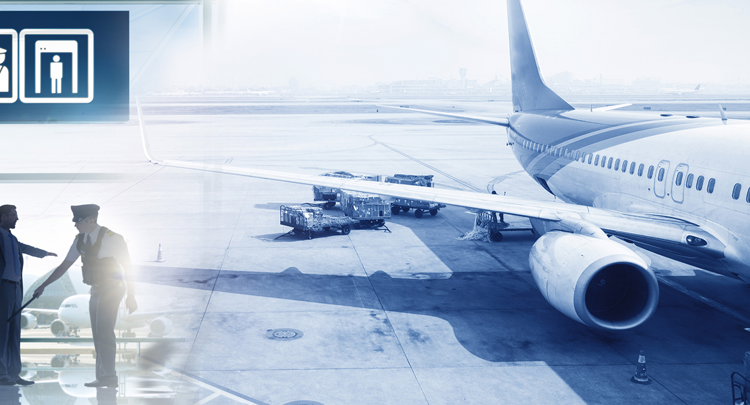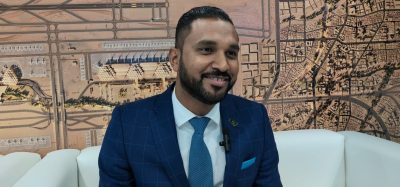Airport 2017: Speakers’ Q&A
- Like
- Digg
- Del
- Tumblr
- VKontakte
- Buffer
- Love This
- Odnoklassniki
- Meneame
- Blogger
- Amazon
- Yahoo Mail
- Gmail
- AOL
- Newsvine
- HackerNews
- Evernote
- MySpace
- Mail.ru
- Viadeo
- Line
- Comments
- Yummly
- SMS
- Viber
- Telegram
- Subscribe
- Skype
- Facebook Messenger
- Kakao
- LiveJournal
- Yammer
- Edgar
- Fintel
- Mix
- Instapaper
- Copy Link
Posted: 6 September 2017 | International Airport Review | No comments yet
With Airport 2017 less than a week from getting underway in Vienna, we hear from just a few of the speakers who will giving delegates an insight into airport IT, security and crisis management. Places are still available.


STILL TIME TO CHECK-IN: Airport 2017 is just one week away
Dr Usama Hasan – Tuesday 9.20am
Dr Hasan is Senior Researcher of Islamic Studies at Quilliam Foundation, a counter extremism think-tank based in London. He holds a PhD, MSc & MA in Physics and Artificial Intelligence from the Universities of Cambridge & London and is a Fellow of the Royal Astronomical Society and of the Muslim Institute. His work with the foundation started in 2008 as a founding adviser. At Airport 2017 he will explain the pathways to extremism, covering the mindset of an extremist and behavioural indicators to their radicalisation.
Looking at the conference’s programme, who among your fellow speakers are you most interested to hear from and why?
I’m looking forward to listening to the flight attendant and other crew on bard the Daallao Airlines flight that was disrupted by a bomb explosion en route from Mogadishu to Djibouti (Wednesday, 4.15pm). These brave people must have a very scary but heroic story.
You are the head of Islamic Studies at Quilliam, a worldwide organisation countering extremism. In your address, you will cover the identification of radicalisation in the work place. How important is it for people working in the airport industry to hear what you have to say?
Next year will be the 30th anniversary of the Lockerbie bomb that destroyed a PanAm airliner and murdered 270 people. The conference is immediately after the 16th anniversary of 9/11. We have seen at least six major terrorist attacks on airports worldwide in the past decade. Sadly, airliners and airports have for long been a favourite target of terrorists. The case of Rajib Karim, a British Airways IT worker convicted in 2011 for conspiring with Al-Qaeda to attack aviation targets in the UK and US, shows that radicalisation in the workplace may be lethal. With Al-Qaeda now resurgent, and defeated ISIS fighters hoping to continue attacking nation-states around the world through terrorism, the threat to airports remains high.
In your work, have you identified any examples of sensitive and well-reasoned approaches to tackling radicalisation in the work place in any airports?
I will be presenting an approach to counter-radicalisation in the workplace generally, not just airports, that is widely used by practitioners in the UK.
Does Quilliam get contacted by airport operators interested in taking measures to tackle extremism in the workplace or has the onus rested mostly on Quilliam?
Most of our work has involved communities, schools and colleges. However, we have had more and more enquiries from employers in the corporate sector, and we expect that to increase. After building up our expertise over a decade, we are also now aiming to proactively reach out to corporate employers to advise on issues of radicalisation and extremism. We certainly hope that airports and the aviation industry will be part of that work.
Lucy McAuliffe – Tuesday 11.25am
Ms McAuliffe is the Passenger Security Operations Manager at Gatwick Airport, the busiest single-runway airport in the world. She will be the first speaker in our Best Practice: Airports Resolving Specific Challenges series, talks given by airport security departments to illustrate how they have been successful in overcoming specific security issues. Her talk is entitled ‘A High Performance Approach to Security at Gatwick Airport’.
Looking at the conference’s programme, who among your fellow speakers are you most interested to hear from and why?
I am keen to hear from other airport operators to learn from best practice in aviation security but I am excited about entire event having reviewed the varied level of content.
Do you see airports sharing their innovations in security more or less than they have over recent years and what would you say is the best way for those concerned to learn from their competitors/colleagues?
There is more collaboration between airports than ever before as there are many more for a in which airports can come together to share experiences and better practices. The greater proliferation of industry events has made it easier for airports to share and learn with and from each other.
Which airports would you say Gatwick look to compete with in maximising the efficiency of its security?
Gatwick does not see maximising the efficiency of security processes as a competition. The safety and security of our passengers and staff is our number one priority. While we are always looking to share best practice and learn from others, we remain focused on how we can continue to improve our processes for the benefit of our passengers, not on competing with other airports.
What would you say has been the most innovative step forward in the realm of airport security over the last decade has been? Or what technology in the foreseeable future stands to make the greatest difference to how we fly?
Focusing on the passenger experience as we have done at Gatwick over recent years has driven improvements across the whole airport. Keeping in mind what makes passengers journeys most enjoyable – reducing queues, an efficient and safe security process and friendly, knowledgeable staff – things we pride ourselves on at Gatwick.
Peter Holmes – Tuesday 4pm
Mr Holmes is the Aviation Operations and Compliance Manager at Launceston Airport in Australia. His presentation is one of our case studies on securing regional airports. He will discuss why the approach that works for JFK and Heathrow or Vienna might not be suited to a regional airport like Launceston.
Looking at the conference’s programme, who among your fellow speakers are you most interested to hear from and why?
Dr. Stephen Mitroff & Phillip Baum – the Human factors aspects of capable screeners and screening challenges along with detecting negative intent by behavioural analysis (Wednesday 12.20pm) best reflect our particular challenges and a particular vulnerability for airport screeners and security staff. As is advancing knowledge to safely counter contemporary threats such non-metallic and homemade IED. Bio metrics for identify including use of facial recognition technology. Integrated approaches to whole of airport security – Airport security isn’t just passenger screening.
Do you see airports sharing their innovations in security more or less than they have over recent years and what would you say is the best way for those concerned to learn from their competitors/colleagues?
Definitely increasing in sharing it’s currently underdone. Commercial competitive tension in relation to screening or security provision by third party providers often hinders the open sharing of innovation airport to airport.
Do you feel smaller airports are recognised enough when they do innovative work in security?
I can only speak from an Australian context – the paradox with security is how do you safely share information on security practices – which may confound the sharing of innovative solutions at other; particularly smaller airports. Another factor is the prevalence of third party providers in security.
What would you say has been the most innovative step forward in the realm of airport security over the last decade has been? Or what technology in the foreseeable future stands to make the greatest difference to how we fly?
Perhaps both the most innovative and contentious – in relation to privacy – the confirming of passenger identity through use of bio metrics at multiple points in the journey including for on airport personnel. Improving software capability in tandem with hi definition CCTV.
Wayne Smith – Tuesday 3.05pm
Head of IT Services at Birmingham Airport, Mr Smith will talk about his preferences, frustrations and experiences of his cloud projects with focus on a cloud-based (hosted) telephony project that has recently been completed.
Looking at the conference’s programme, who, apart from yourself are you most interested to hear from and why?
The unexpected person that I don’t know yet.
You say you have a pet hate for the word cloud. What would you like people who perhaps use it erroneously or with the notion it is always beneficial to shift to cloud services to know most?
Stop using trendy marketing terms. Say what they mean.
What would you say are the biggest challenges facing airport operators attempting to bring about change?
Time – running the day to day operation is challenging enough.
Which airport or airports are doing the best work to keep abreast of developments in the aviation industry and safeguarding for the future?
The ones who have lots of money to invest and have forward-thinking leaders who embrace IT.
Are events like Airport 2017 beneficial for people working in your industry and why?
Yes – They get to share ideas, but more importantly they get to realise that we are all having the same issues and that we are not alone in the struggles that we are facing.
Karl-Heinz Keller – Tuesday 11.40am
Mr Keller is Business Manager and TAM Coordinator at the German Aerospace Centre (DLR). He will moderate a panel discussion on enabling the multimodal airport of the future. His fellow panellists include Senior Airside Masterplanner at Munich Airport Cristopher Schneider, IT Security Project Manager with Groupe ADP Olivier Delain and Alan Marsden, Technical Expert with EUROCONTROL.
How important is it for airports as a business to regard themselves as part of a greater transportation network?
I’m not an airport operator but my impression is that many airports still not see them as being part of a greater transportation network, but they should do so! Those airports with capacity issues (mainly hubs) need to replace the smaller regional feeder by i.e. high speed train connections.
In the airport industry, which position holders would benefit most from what you have to say?
All level of aviation operations people. Might be a little less interesting not those who are dealing with non-aviation aspects
What road bumps do you see in the future for SESAR 2020?
Less acceptance of SESAR solutions; less innovation; not covering multimodal / passenger issues;
Are events like Airport 2017 beneficial to those in your line of work and why/why not?
Interesting to see the state-of-the-art in Airport IT&T/ Security topics; get in contact to people who think outside of the beaten tracks to team up with those open minded people to define the future.
Chris Bishop – Tuesday 11.30am
Mr Bishop is Vice President of International Business Development at security systems company Synectics. His presentation will show how the integration of disparate technologies deliver a complete situational awareness.
In your opinion, which airports (aside from your own) appeal to you as most prepared for crisis and disaster?
Changi airport, Singapore
Who among your fellow speakers are you interested to hear from and why?
Yasushi Oshima, Narita International Airport Corporation. Keen to understand their approach to Disaster management.
How important are events like this to help airport operators ensure they are in the best possible position to tackle crisis and disaster when they do arise?
These types of events that allow professionals to share their experience, knowledge and technological advancements are critical.
What would you say have been the most significant developments in this field over the last 12 months?
Biometrics and behavioural analytics
Related topics
Airport crisis management, Conferences and events, Cyber-security, Information technology (IT), New technologies, Security
Related airports
Birmingham Airport (BHX), Launceston Airport (LST), London Gatwick Airport (LGW)
Related people
Dr Usama Hasan, Karl-Heinz Keller, Lucy McAuliffe, Peter Holmes, Wayne Smith


















